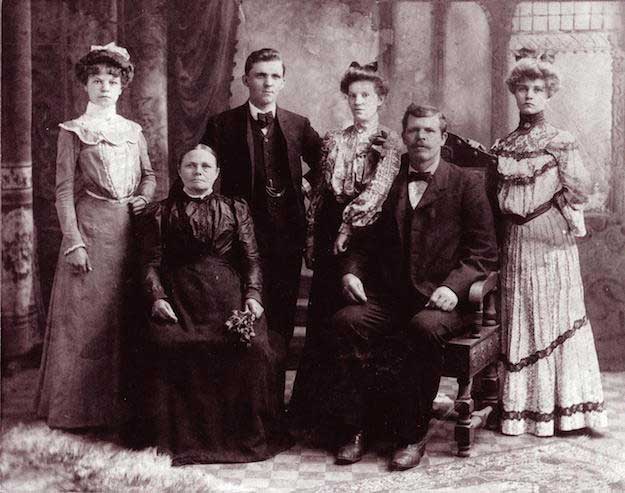Historian’s immigrant ancestors from Poland certainly made a mark after moving to Albion
Romanski family worked in quarries, helped establish a church, ran a restaurant and did some bootlegging
ALBION — A photograph, taken around 1900, shows my immigrant ancestors from Poland.
Seated at center are Joannes Romanski and Anna Szybanska. Their children stand behind them, including, from left, Rozalia “Rose” Romanska Crane, Franciszek “Frank” Romanski, Maria Smolenska Romanski, and Valeria “Fannie” Romanska Wilson.
Rose is likely around 14 years old in this photograph, while Frank and his wife, who were wed on Nov. 20, 1899, were likely enjoying the honeymoon phase of their marriage.
Joannes Romanski was born on July 5, 1852, in the small village of Rybieniec, Poland, then situated in Prussia. Anna, his wife, was born Nov. 12, 1852, in the nearby village of Wabcz.
The couple brought their three young children to the United States, arriving at the port of New York on April 4, 1887.
As was typical for new immigrants arriving to Orleans County in the latter quarter of the 19th century, Joannes commenced work as a laborer in one of the numerous sandstone quarries within the vicinity of his home on the eastern end of Albion. Records from St. Mary’s Assumption Church suggest that he was one of the earliest movers and shakers who worked to establish one of the first rural Roman Catholic mission churches for Polish immigrants outside of the city of Buffalo.
Little is known about the family’s economic disposition in Poland, but Joannes opened a restaurant on Densmore Street shortly after his arrival in Albion. He operated that business through the early 1910s with the help of his family, until he suffered a stroke that left him paralyzed for the last remaining years of his life.
He died on Nov. 30, 1914, at the age of 62.
Anna continued to operate the family business in the years following her husband’s passing.
Frank followed in his father’s footsteps and purchased the Continental Hotel in Batavia, likely relying on the business experience gained while working in the family restaurant. His luck, unfortunately, was short-lived.
The hotel was taken over by a receiver in 1907 who was attempting to retrieve debts for various creditors. Meanwhile, “Frank [was] scooting around and enjoying life with an auto[mobile].” Following his short tenure as a restaurant owner, he pursued a job as a detective on the New York Central Railroad and stationed himself out of Batavia for several years. Romanski earned quite the reputation in law enforcement, finding himself at the center of attention, and appearing frequently in the local newspapers for various acts of “heroism.”
In July 1909, he was violently assaulted by a well-known lumber dealer in Batavia, which Romanski claimed was unprovoked. John Wade and an accomplice stumbled across Romanski patrolling the local NYC tracks and pummeled him with pieces of three-inch sewer pipe.
The following month, Romanski was involved in a gunfight with railcar burglars, resulting in one officer receiving a gunshot wound to the thigh, and one burglar receiving six gunshot wounds in his thigh, legs, ankle, and heel. Frank became quite familiar with gunplay as he surprised Frank Stybus as he riffled through a railcar in November of 1910, shooting the burglar as he ran off.
Three years later, Romanski was accused of collaborating with railcar burglars, tipping them off to potential threats in return for a fair share of the loot.
The Romanski sisters were just as culpable in their own unscrupulous practices during Prohibition.
After the passing of their mother in 1924, Rose assumed control of the family’s restaurant with her second husband, Frank Crane. According to family lore, Frank Crane would brew hard cider in the basement of their home, which was sold to local patrons out of a secret room in the back of the house.
Of course, this lore is corroborated by the numerous liquor raids on the restaurant, including one in June 1930 when Rose was served with a warrant to appear in front of a U.S. Commissioner. When their own homebrew was unavailable, they relied on Rose’s sister, Fannie, to ship liquor to Albion from Fannie’s store in Port Colburn, Ontario.
Even though Frank and Rose Crane fought the good fight, I suppose we all have skeletons in the closet!
























































